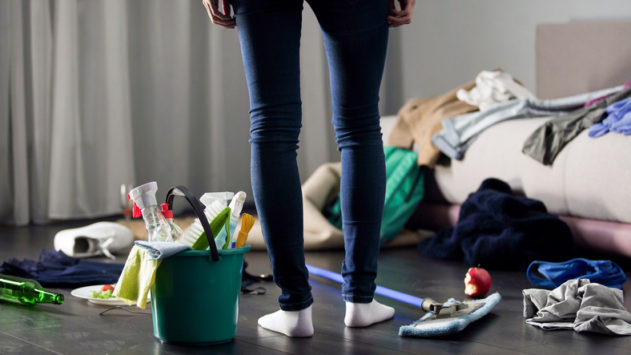There’s nothing I can let go of that ends my renewed experiences of stigma and shame surrounding mental illness.
Housekeeping is not the measure of me as a woman. I know this, and I have known it as far back as I can recall. I come from a long line of women who keep more dust than house, and for most of my adult life, I have been perfectly content in my solid C- to D+ housekeeping.
But that was before minimalism and the KonMari Method rained hailstones of wisdom on my household paradigm. The rhetoric of letting go of possessions to free myself from the past and open up my life to new experiences is practically irresistible to me, and maybe it is to you, too.
Here’s the thing. I’m pretty suspicious of anyone or any program that can sell me a new lease on life. Underpinning the notion of such a purchase is the idea that I’m doing it wrong. Regardless of what it is, the one-size-fits-all cure means there’s a right way to do it and we all should be doing it that way. If we were talking pizza, this would be a slice of tyranny deluxe.
When I think about my life and my home, and what it would mean to KonMari it, I think of creating a space that is less obviously dominated by mental illness. Often I push myself to get out of bed, cook, do laundry, leave the house, and write, but I don’t push myself to mop the floors, dust, or tidy much in general. Goodness, I know it would be easier to dust if I kept fewer books and pictures on the shelves, or if I didn’t use my coffee table as a home office/dining table.
My home could probably use a shot of letting go. That said, having moved across the country with one suitcase and later moving to a new city with the entire contents of my life shoved into the back of a Jeep Patriot, I can confidently say less stuff isn’t a shortcut to remission. There’s nothing I can let go of that ends my renewed experiences of stigma and shame surrounding mental illness.
So when I think of a better-kept house, I automatically think of a better-kept secret: mental health compliance and compliance to what society expects of me as a woman. Up until recently, I have always felt privileged to keep house like a bachelor. It means I’ve enjoyed the freedom to do other things. I didn’t judge myself by the untidiness of my dresser top because I grew up in a cluttered home, raised by competent and loving people. I saw myself as they did, creative and chaotic, a collector of ideas, objects, and projects.
But over the last few years, the judgment has crept in, or rather I have let it in via my Instagram feed. I didn’t realize how completely I had absorbed the ideal of a tidy home until I considered piling every article of clothing I own on the bed and picking up each item to consider whether it sparks joy.
I thought about embarking on that journey today (when did I give stuff the power to put me on a journey?), but I decided to write instead, because this is what I want, and it is what I have wanted since I was a little girl—to be a writer.
For me, housekeeping has always been a matter of negotiating time. I can’t spend my time twice, so I’m willing to make concessions in terms of my home’s appearance to afford to be able to do other things. When it comes to cleaning, I’m a fan of the high stakes kind where there’s a clear difference between before and after. Vacuum cleaner tracks don’t do it for me; I want that Hoover to pick up dirt.
Life leaves marks. I like to collect stuff from thrift stores. I re-read my books. Owning them makes me feel wealthy. I have hobbies that take up space. I live with long seasons of depression that leave me moving at the speed of a sloth. My home reflects these things. But it’s also a space where I feel safe and where I create. If I can accomplish those things here, it means my space is working for me, in its own quirky anti-KonMari way.
Lynda Williams is a writer, tutor, and furniture rehab artist, passionate about mental health advocacy. Her blogs have been featured on bp.hope.com and the mighty.com.
Other Links:

